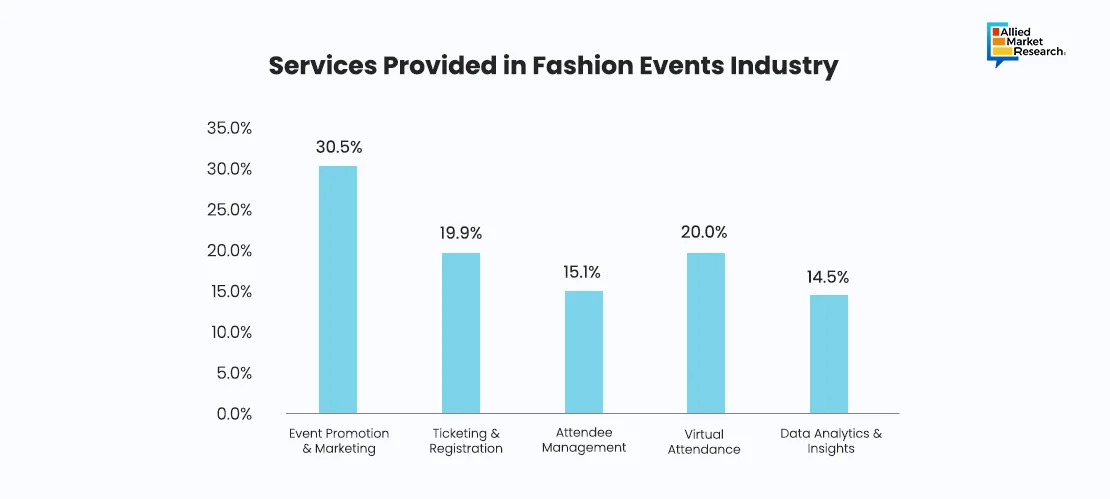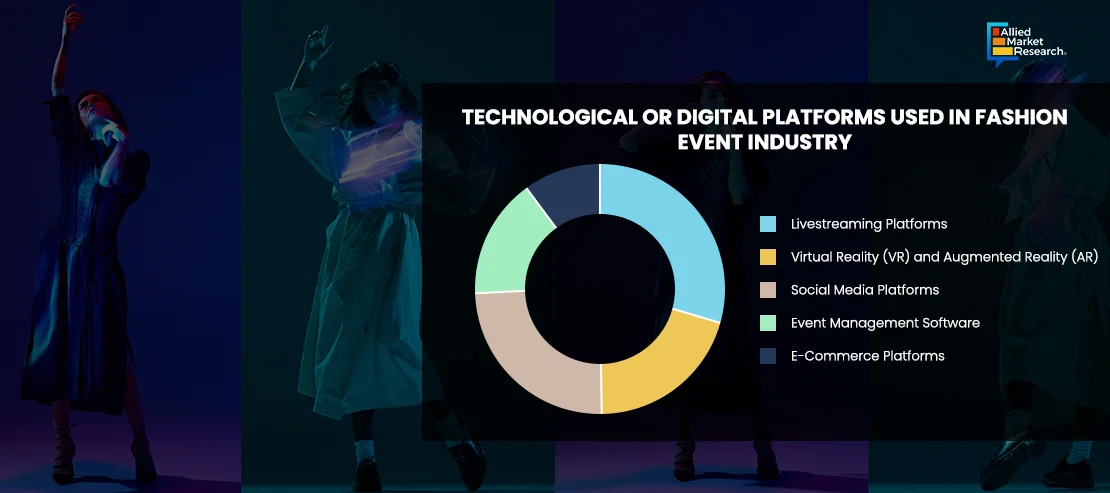Table Of Contents
- Landscape of Technological Adoption
- Changing Technological Landscape: The Impact of Tech Trends on Fashion Events
- Fashion-Tech Fusion: Meeting the Diverse Needs of Users
- Technological Barriers and How to Overcome those in Fashion Events Industry
- Transforming the Future of Fashion Event Industry: From AI to VR
- Conclusion

Roshan Deshmukh

Renuka Sathaye
TechCouture: Unveiling Growth Prospects of Fashion Events

The fashion events industry includes a wide variety of events, such as pop-up shops, fashion contests, trade shows, runway presentations, and fashion weeks. These events have multiple objectives, such as introducing new collections, encouraging partnerships, and increasing customer interaction. For this, the fashion events sector adopts technical platforms and infrastructure, facilitating planning, coordination, and promotion of events in the fashion industry. This technological dynamism boosts attendee interaction, streamlines event organization, and enhances brand exposure by utilizing digital marketing tools, multimedia platforms, and event management software.
For instance, Cvent, a leading participant in this sector, provides tailor-made software solutions for event management that are specifically designed for the fashion industry. By utilizing Cvent's platform, fashion event organizers efficiently manage attendee registrations, optimize logistics, and leverage digital marketing tools to enhance event promotion. In addition, prominent multimedia platforms such as Instagram and YouTube play a vital role in showcasing fashion events to a global audience, enhancing brand visibility and engagement within the industry.
Landscape of Technological Adoption
Traditionally, fashion events were often exclusive, but with the rise of digital technologies, they have become more accessible to a global audience. Now, fashion events, once exclusive, are open to everyone globally, due to digital platforms. This transition has made fashion more inclusive and has completely changed how people across the globe enjoy and appreciate fashion.
The fashion events industry has started utilizing technology to improve attendee experiences, optimize operations, and broaden the audience. These specific needs are being addressed by a combination of innovative solutions and dynamic platforms that define the current level of technology in this field.
The fashion events market is characterized by a moderate to advanced level of technological maturity. Platforms for event management, such as Cvent and Eventbrite, which provide all-inclusive solutions for organizing and supervising fashion events, are important innovators. Furthermore, companies such as Attendify and Bizzabo focus on giving event management software with features, including attendee networking and engagement tools that are specifically designed to meet the requirements of the fashion industry.
Enhancing virtual and hybrid event capabilities has been the focus of recent technological developments. Platforms such as Hopin and Zoom have become crucial for organizing virtual exhibitor booths, live streaming, and interactive sessions for fashion events, especially with the growing popularity of distant participation.

The event promotion and marketing service in the fashion events sector dominated other services and made up 30.5% of all services provided globally in 2021. Strong marketing campaigns are necessary because the fashion industry depends on exposure and brand promotion. Furthermore, the popularity of social media platforms has increased the need for promotional services by offering low-cost ways to reach a global audience. Fashion brands also increased their investments in digital marketing and promotion due to the pandemic's shift towards virtual events. Together, these developments increased the significance of marketing services and event promotion, securing the industry's significant market share globally.
Ticket sales of fashion events have been made easier by online ticketing platforms that offer features such as mobile ticketing, QR code scanning, and customized offers. Pricing strategies and attendee preferences can be better understood by event organizers with the help of data analytics. Technology makes fashion event sponsorship possible through immersive brand experiences, sponsored content development, and digital advertising. Virtual event systems provide sponsors with the chance to present their products, engage with participants, and monitor engagement metrics instantly. Moreover, hosting fashion weeks, introducing product displays, planning industry conferences, arranging networking events, and running virtual trade exhibitions are some of the possible applications of fashion events technology.
Changing Technological Landscape: The Impact of Tech Trends on Fashion Events
Fashion events technology is currently in a well-established stage of development, with reliable platforms and products available in the market. Although there is constant progress towards integrating advanced technologies such as artificial intelligence and augmented reality, the fundamental features and infrastructure remain strong, catering to the ever-changing demands of the fashion industry.

Fashion events technology revolutionizes event management in the fashion industry by offering comprehensive solutions for scheduling, ticketing, promotion, and event organization. By integrating various platforms, it facilitates effective collaboration among sponsors, vendors, designers, brands, and attendees, thereby enhancing communication and coordination. Furthermore, the integration of digital platforms such as social media, websites, and mobile apps increase the impact and reach of fashion events. Through these channels, event planners boost their promotional efforts, attract a wider audience, and foster increased engagement among participants. In addition, digital platforms enable real-time communication and interaction, ensuring that attendees remain well-informed and connected throughout the event.
Fashion houses leverage technology for various functions such as managing the supply chain, creating 3D clothing, designing digital patterns, and showcasing virtual fashion. The integration of artificial intelligence in supply chain management enhances transparency and security, ensuring authenticity at every stage. AI driven 3D design software accelerates the creation of virtual prototypes, while digital pattern production optimizes material usage.

Fashion-Tech Fusion: Meeting the Diverse Needs of Users
This technology addresses various user needs within the fashion industry, including:
Efficient event management within the fashion events industry streamlines the complexities of hosting fashion events by simplifying tasks such as guest registration, agenda planning, and venue booking. For instance, event management software, including Eventbrite offers comprehensive tools to simplify event organization and automate recurring duties. Through these cutting-edge technologies, fashion event organizers efficiently conserve valuable time and resources, allowing them to focus on delivering exceptional experiences for attendees.
In addition, these platforms enhance engagement by incorporating interactive elements that captivate and include users. For instance, there are some virtual event platforms that offer networking chances, live Q&A sessions, and interactive workshops, boosting meaningful connections and engagement among attendees.
These features elevate the event experience, establishing a more immersive and memorable setting for participants. Furthermore, data analysis plays a vital role in enhancing fashion events. Organizers gain valuable insights to enhance the direction of their future events and marketing tactics through the evaluation of demographic, preferences, and behavioral data of attendees.
Technological Barriers and How to Overcome those in Fashion Events Industry
The fashion events industry faces numerous challenges despite the potential offered by technological advancements. The deployment of AI-powered systems faces substantial obstacles from privacy breaches, data misuse, and algorithmic biases. Furthermore, the digital gap is expected to pose a risk of increasing inequalities by preventing some groups of people from accessing technology-driven experiences. Moreover, an excessive dependence on technology is anticipated to detract from the human aspect of fashion events, thus compromising originality and spontaneity.
It is essential to address these challenges through an integrated strategy including regulatory frameworks, collaborative initiatives within the industry cooperation, and education campaigns. Establishment of policies is essential to protect customer information and ensure the ethical utilization of AI innovations. It is essential to promote inclusivity and enhance digital skills to narrow the divide between tech enthusiasts and critics. Prioritizing diversity and representation play a significant role in fostering an inclusive and equitable atmosphere within the tech sector.
Furthermore, for instance, social media sites such as Instagram and TikTok are essential for advertising fashion events and interacting with viewers before, during, and following the event. Organizers use data analytics technologies to collect insights about the preferences and behavior of attendees to maximize the impact of future events. In addition, visitors immediately buy products that are shown due to the integration of e-commerce platforms, which reduces the gap between the virtual and physical parts of fashion events.
Transforming the Future of Fashion Event Industry: From AI to VR
The fashion event industry stands at the edge of a technological revolution, with advancements such as artificial intelligence (AI), virtual reality (VR), and augmented reality (AR) reshaping the entire landscape. The industry is undergoing a significant transformation by leveraging AI-driven insights to optimize design and engage audiences, and immersing viewers in virtual runway shows through VR/AR experiences. These technologies offer opportunities for creativity, accessibility, and sustainability, promising to redefine the conception, execution, and experience of fashion events. From virtual fitting rooms to blockchain-enabled authenticity, the integration of technology and fashion is unlocking new possibilities and paving the new way for growth in the future.
For instance, Farfetch Limited has implemented AR technology through its innovative "See My Fit" feature. This remarkable feature enables shoppers to utilize their smartphones' camera to visualize the fit of the clothing. This technology empowers shoppers to make well-informed purchasing decisions by displaying virtual models wearing the selected clothing items in the size and fit of the user.
Furthermore, convergence of technical expertise, and cultural acceptance is necessary to realize the full potential of innovations in technology in the fashion events sector. Technological advancements need to give priority to interoperability and data security to promote trust and collaboration in the industry.
Conclusion
To sum up, the fashion events market is experiencing a major shift in technology that is being propelled by the combination of digital innovation and changes in customer demands. Every facet of event planning and execution is changing due to the adoption of technology. The future of fashion events appears bright, with sustainability initiatives, hybrid formats, and the metaverse emerging as a powerful force for change. As technology advances, the organization and implementation of these events are anticipated to experience substantial changes, fostering innovation, inclusivity, and greater engagement.
To gain more insights into it, get in touch with our analysts!

